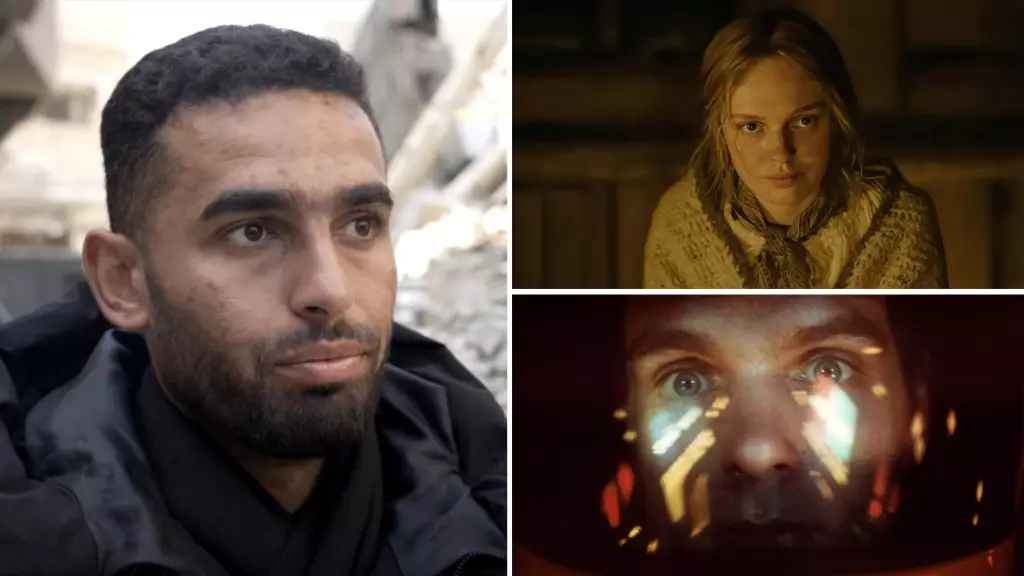As awards season unfolds, the film industry is abuzz with anticipation, and among the contenders, “From Ground Zero,” Palestine’s official submission for the Best International Feature Oscar, stands out. Set to premiere this weekend across approximately 70 AMC locations in major markets and some art-house theaters, including iconic venues like the Quad in New York and Laemmle Royal in Los Angeles, this innovative documentary offers a unique lens through which to explore the complexities of life in Gaza. Created by Watermelon Pictures, the film brings together 22 poignant video diaries curated by Rashid Masharawi, a Gaza native currently residing in France, who sheds light on the harrowing realities faced by Palestinians under constant threat of violence.
What makes “From Ground Zero” particularly compelling is its deliberate avoidance of overt political discourse. Instead, it focuses on the personal narratives of individuals striving to endure their unstable existence. The directors, through these video diaries, manage to capture small moments of joy and resilience against a backdrop of despair and fear. This film serves as both a stark reminder of the ongoing humanitarian crisis and a tribute to the strength of the human spirit. Masharawi’s involvement and prior initiative to start a fund to support filmmakers in Gaza reinforces the film’s mission—bringing attention to the narratives often overlooked by mainstream media.
The choice to open the film shortly after the Oscar shortlists were revealed reflects not just a gamble but a courageous commitment to amplifying underrepresented voices in cinema. As Justin DiPietro, the Executive Vice President of MPI Media, notes, the distribution strategy involves flexibility that could potentially allow smaller, independent films to find their footing in a saturated market.
With the theatrical release of “From Ground Zero,” there’s a recognition of the film as a pivotal moment not only for Palestinian cinema but for human storytelling. Masharawi’s description of the film as “an unfiltered window into the resilience, creativity, and humanity of those living through unimaginable hardship” captures its essence perfectly. Critics have received the film well, with a commendable 93% rating on Rotten Tomatoes based on early reviews.
The decision to feature the film in locations with substantial Palestinian populations—such as Chicago and Detroit—demonstrates a strategic understanding of audience engagement. The film has previously made waves at film festivals including TIFF and Palm Springs, indicating its appeal beyond just the immediate geographic and political context.
“From Ground Zero” arrives at an interesting time, paralleling the release of other films vying for attention during the busy awards season. For instance, horror-thriller “The Damned,” directed by Thordur Palsson, opens simultaneously, showcasing the dichotomy of narratives in cinemas today. Set in a 19th-century Icelandic fishing village, it tells a harrowing tale of survival that evokes similar themes of ethical dilemmas faced in extremes. This juxtaposition of a politically charged documentary and a suspense-filled thriller demonstrates the diverse storytelling avenues currently available in theaters.
While films like “From Ground Zero” aim to bring critical social issues to light, offerings like “The Damned” provide a different form of reflection on human nature. Audiences are thus faced with a rich tapestry of cinematic experiences that invite contemplation on morality, resilience, and the human condition.
In an adjacent but equally intriguing vein, New York City’s Film Forum is embarking on a three-week retrospective underscoring the narrative surrounding artificial intelligence in cinema. Titled “From Metropolis to Ex Machina,” this program explores how cinematic storytelling has presented AI over nearly a century. With classic films like Fritz Lang’s “Metropolis” and Stanley Kubrick’s “2001: A Space Odyssey,” the retrospective invites audiences to engage with historical portrayals of technology and its implications for society.
Bruce Goldstein, the Repertory Artistic Director of Film Forum, acknowledges the overwhelming presence of AI discussions in today’s media landscape, sparking a need to examine the portrayals of these technologies in films. The festival highlights a spectrum of narratives—from dystopian visions to more benign representations—and critically examines the underlying messages regarding AI throughout cinematic history.
As both “From Ground Zero” and “From Metropolis to Ex Machina” suggest, cinema remains an essential medium for exploring profound questions about humanity, survival, and societal challenges. Through the lens of personal stories—whether facing the brutal realities of war or engaging with futuristic technologies—film has the power to inspire empathy, raise awareness, and evoke meaningful conversations. As audiences gather to witness these portrayals, they partake in a shared cultural experience that transcends borders, encouraging a deeper understanding of the diverse narratives that shape our world.

Leave a Reply